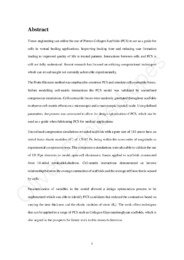In silico investigation of cell-matrix mechanobiology inside porous collagen scaffolds

View/
Date
2023-06-07Author
Santos-Lopes, OliverPublisher
Πανεπιστήμιο Κύπρου, Πολυτεχνική Σχολή / University of Cyprus, Faculty of EngineeringPlace of publication
CyprusGoogle Scholar check
Keyword(s):
Metadata
Show full item recordAbstract
Tissue engineering can utilize the use of Porous Collagen Scaffolds (PCS) to act as a guide for cells in wound healing applications. Improving healing time and reducing scar formation leading to improved quality of life in treated patients. Interactions between cells and PCS is still not fully understood. Recent research has focused on utilizing computational techniques which can reveal insight not currently achievable experimentally.
The Finite Element method was employed to construct PCS and simulate cell contractile forces. Before modelling cell-matrix interactions the PCS model was validated by unconfined compression simulations. Cell contractile forces were randomly generated throughout scaffolds to observe cell-matrix effects on a microscopic and a macroscopic (spatial) scale. Using defined parameters, the process was automated to allow for design optimization of PCS, which can be used as a guide when fabricating PCS for medical applications.
Unconfined compression simulations revealed scaffolds with a pore size of 110 μm to have an initial linear elastic modulus (E*) of 179.07 Pa, being within the same order of magnitude as experimental compression tests. The compression simulations were also able to validate the use of 1D Pipe elements to model open-cell elastomeric foams applied to scaffolds constructed from 14-sided tetrakaidekahedrons. Cell-matrix interactions demonstrated an inverse relationship between the average contraction of scaffolds and the average stiffness that is sensed by cells.
Parametrization of variables in the model allowed a design optimization process to be implemented which was able to identify PCS candidates that reduced the contraction based on varying the strut thickness and the elastic modulus of struts (Es). The work offers techniques that can be applied to a range of PCS such as Collagen-Glycosaminoglycan scaffolds, which is also argued in the prospects for future work in this research direction.
